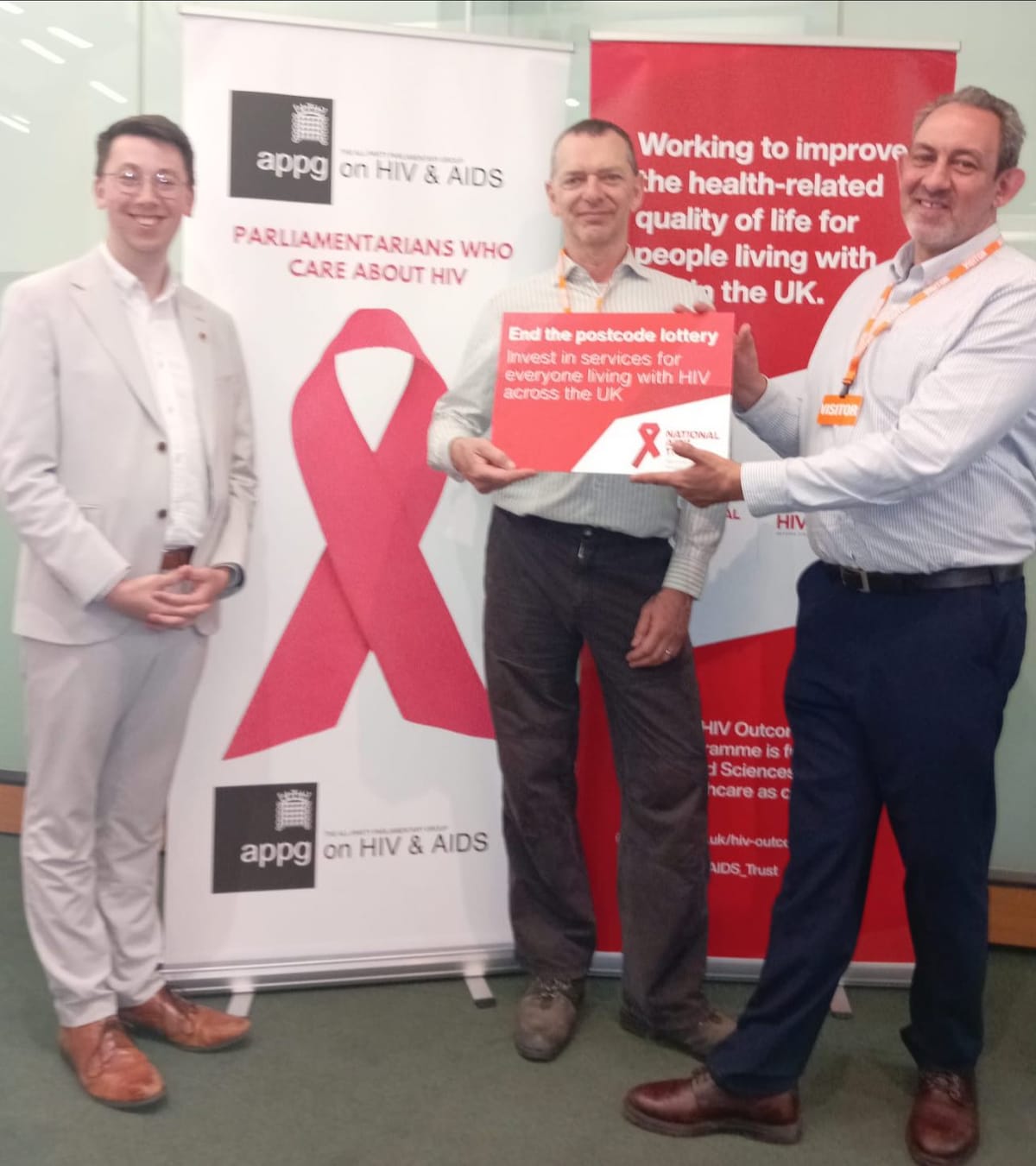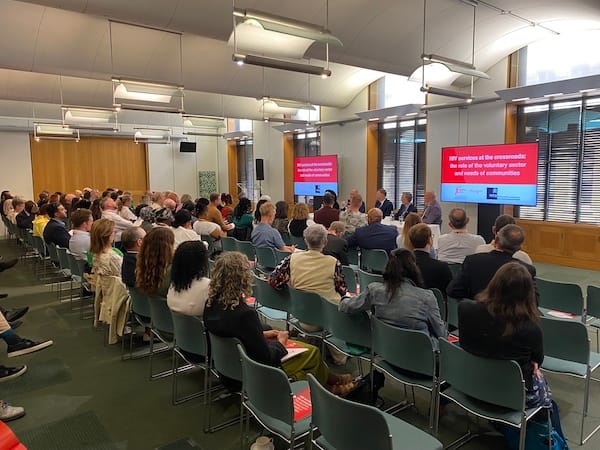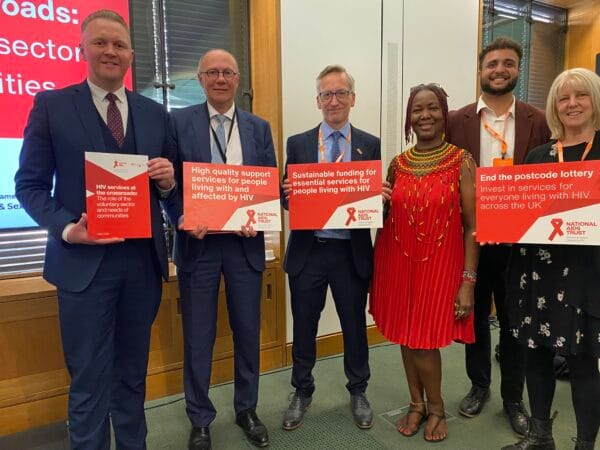Lunch Positive visits Parliament for launch of new report, which warns target to end new HIV transmissions by 2030 is at risk
Brighton-based community HIV charity Lunch Positive visited Parliament on Tuesday, 20 May with Councillor Jacob Allen for Woodingdean for the launch of a new report from HIV Outcomes UK, a coalition of HIV experts, which has warned that the target to end new HIV transmissions by 2030 is at risk with

Brighton-based community HIV charity Lunch Positive visited Parliament on Tuesday, 20 May with Councillor Jacob Allen for Woodingdean for the launch of a new report from HIV Outcomes UK, a coalition of HIV experts, which has warned that the target to end new HIV transmissions by 2030 is at risk with funding reductions leaving people living with and affected by HIV without vital voluntary sector support and services.
The report – HIV services at the crossroads – draws on evidence taken from more than 50 HIV-focused organisations across the UK, and more than 300 people living with HIV.
Writing on social media, Gary Pargeter, Director of Lunch Positive, said: “It was great to visit Parliament to be part of the launch of this hugely important HIV Outcomes Report from National AIDS Trust and partners alongside the All Party Parliamentary Group for HIV and AIDS.
“The role of the community and voluntary sector is central to support people living with HIV, and financial support the community and voluntary sector is essential. Our charity, Lunch Positive is community based and peer-led, volunteer delivered and at the frontline of support locally, to decision makers, funders and supporters, please help us and others continue our work.”

It found that:
– Two thirds of these organisation reported having to either reduce staff numbers, close services, merge with other organisations or use cash reserves to cover operating costs in the last three years
– Only three out of 50 felt that they have been completely able to meet demand over the last five years
– There are stark inequalities in access to HIV support across the UK. People living outside major cities often face a postcode lottery in services, with many rural areas lacking any local provision
– Whilst four in five people living with HIV surveyed reported improved wellbeing after accessing these services
According to National AIDS Trust, which is part of the coalition: “It is clear that HIV Voluntary, Community and Social Enterprises (VCSEs) continue to deliver life-changing – and often life-saving – support. The research shows how HIV charities deliver vital, cost-effective services which respond to health inequalities that statutory systems often overlook. From peer support to housing assistance, these services address 80% of the factors determining health outcomes, yet are often delivered on precarious, short-term funding.”
With case studies from sector organisations and people that have used their services, the report makes a “powerful case” for these “crucial services”, and outlines why they must be safeguarded, to “put the UK back on track to achieving the goal of ending new transmissions by 2030, but also to ensure that people living with and affected by HIV beyond 2030 are able to access this essential support”.
The report sets out a series of “urgent, actionable recommendations” for governments across the UK, commissioners, and key decision-makers, including:
- Renewed partnerships between UK Governments and the voluntary sector for the delivery of HIV Action Plans
- Multi-year funding agreements that cover core costs to ensure the sustainability of essential HIV services
- A national guarantee of access to high-quality psychosocial and peer support
- Comprehensive re-engagement programmes to support people who have fallen out of care and reduce preventable ill health
- Expanded investment in voluntary sector-led HIV prevention, testing and anti-stigma initiatives

James Cole, Senior Policy Manager at the National AIDS Trust, said: “HIV voluntary organisations change lives every day. Our research shows that services help people to live well with HIV and consistently reach underserved communities. But their ability to keep delivering this vital work is under serious threat.
“We hope this report is a wake-up call to governments and commissioners across the UK. Without urgent action, we risk leaving communities behind and missing the chance to be the first country to end new HIV cases by 2030. The recommendations we set out are practical and achievable. With the right investment and partnerships, these vital services can continue to drive progress to 2030 and beyond.”
Manoel Filho, who is living with HIV, added: “Without these charities I wouldn’t be here today. If they hadn’t reached out, I wouldn’t have survived. They’re doing the work government should be doing – giving people like me a chance to live, not just survive.”
Baroness Barker, Co-Chair of the All Party Parliamentary Group on HIV & Sexual Health, and Liberal Democrat Spokesperson for the Voluntary Sector, said: “As someone who has worked in the voluntary sector, I’ve seen first-hand the life-changing difference that charities make. The HIV voluntary sector has always stepped in where others haven’t – reaching communities others can’t and tackling stigma head-on. But this work cannot continue without proper support.
“With the 2030 targets at real risk, the truth is that we won’t reach our goals without the voluntary sector. As the UK Government develops the next HIV Action Plan for England, it must commit to a genuine partnership – ensuring sustainable funding and ending the postcode lottery, so that everyone, wherever they live, can access vital services like peer support.”




